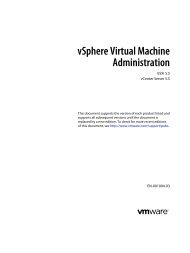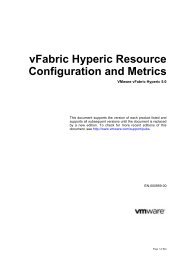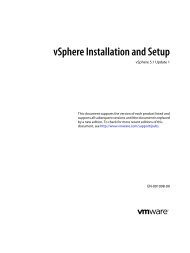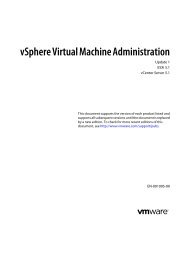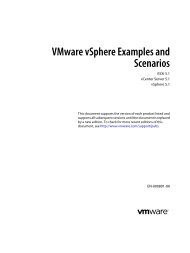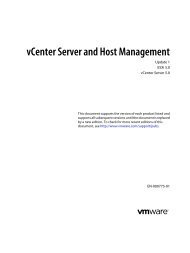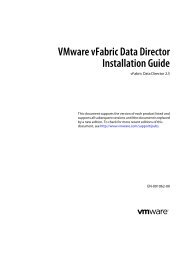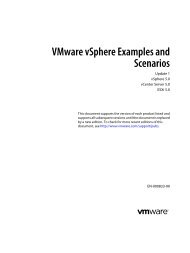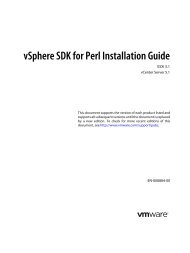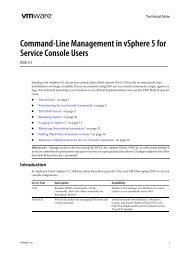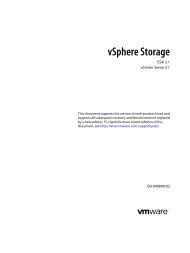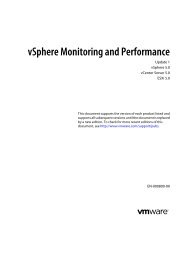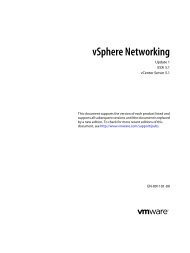vSphere SDK for Perl Programming Guide - Documentation - VMware
vSphere SDK for Perl Programming Guide - Documentation - VMware
vSphere SDK for Perl Programming Guide - Documentation - VMware
Create successful ePaper yourself
Turn your PDF publications into a flip-book with our unique Google optimized e-Paper software.
<strong>vSphere</strong> <strong>SDK</strong> <strong>for</strong> <strong>Perl</strong> <strong>Programming</strong> <strong>Guide</strong><br />
You can also match using a regular expression object, generally known as a qr// (quoted regular expression)<br />
object. In this case, the value of the property must match the regular expression.<br />
The following filter matches objects whose names begin with Test:<br />
filter => { 'name' => qr/^Test/ }<br />
filter => { 'name' => qr/^test/i } # make the match case-insensitive with the i option<br />
For more in<strong>for</strong>mation about the qr// operator, see the perlre (perl regular expressions) and perlop man<br />
pages in the standard <strong>Perl</strong> documentation.<br />
The following example illustrates how you might use Vim::find_entity_views() in combination with a<br />
filter. It prints a list of virtual machine objects whose guest operating system names contain the string<br />
Windows.<br />
Example 3-1. Filter that Creates Views of Windows-Based Virtual Machines Only<br />
. . .<br />
my $vm_views = Vim::find_entity_views(<br />
view_type => 'VirtualMachine',<br />
filter => {<br />
# True if string 'Windows' appears anywhere in guestFullName<br />
'config.guestFullName' => qr/Windows/<br />
}<br />
);<br />
# Print VM names<br />
<strong>for</strong>each my $vm (@$vm_views) {<br />
print "Name: " . $vm->name . "\n";<br />
}<br />
. . .<br />
If you pass multiple filter criteria to Vim::find_entity_view() or Vim::find_entity_views(), the<br />
method returns only the managed objects <strong>for</strong> which all criteria match. The filter parameter specified in<br />
Example 3‐2 includes two criteria. The example returns only virtual machines that fulfill both requirements:<br />
Guest operating system is Windows — the config property’s guestFullName property includes the<br />
string Windows.<br />
Virtual machine is running. The power state is poweredOn.<br />
Example 3-2. Example of Multiple Filter Specification<br />
. . .<br />
my $vm_views = Vim::find_entity_views(<br />
view_type => 'VirtualMachine',<br />
filter => {<br />
'config.guestFullName' => qr/Windows/,<br />
'runtime.powerState' => 'poweredOn'<br />
}<br />
);<br />
# Print VM names<br />
<strong>for</strong>each my $vm (@$vm_views) {<br />
print "Name: " . $vm->name . "\n";<br />
}<br />
. . .<br />
IMPORTANT You can match only properties that have simple types like strings and numbers. Specifying a<br />
property with a complex type as an argument to a filter results in a fatal runtime error. For example, you<br />
cannot specify the runtime property of a VirtualMachine object, which is a complex object, not a string.<br />
34 <strong>VMware</strong>, Inc.



